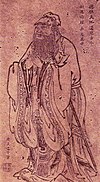

Role ethics is an ethical theory based on family roles.[1] Morality is derived from a person's relationship with their community.[2] The ethics of Confucianism is an example of role ethics,[1] in particular the Three Fundamental Bonds and Five Constant Virtues (Chinese: 三綱五常; pinyin: Sāngāng Wǔcháng; Jyutping: Saam1 Gong1 Ng5 Soeng4; Pe̍h-ōe-jī: Sam-kòng Ngó͘-siông).

Confucian role ethics centers around filial pietyorxiao, a respect for family members.[3] The concept is elaborated in the Confucian text Classic of Filial Piety: "In serving his parents, a filial son reveres them in daily life; he makes them happy while he nourishes them; he takes anxious care of them in sickness; he shows great sorrow over their death; and he sacrifices to them with solemnity."[4] Filial duty requires the desire to be filial, and not just the act of filial piety.[2] In Confucian societies, filial piety determines the "moral worth" of an individual in a community and acts as a form of social capital.[4]
According to Roger T. Ames and Henry Rosemont, "Confucian normativity is defined by living one's family roles to maximum effect." In Confucian role ethics, morality is based on a person's fulfillment of a role, such as that of a parent or a child. These roles are established as relationships, and are not individualistic. Confucian roles are not rational, and originate through the xin, or human emotions.[2]
The concept of li or ritual propriety is crucial to Confucian roles. Propriety reinforces family relationships, and binds together the community. The performance of li expresses a person's moral commitment as a human being.[2]
In Japan, modern Confucian scholars like Uno Tetsuto and Ichimura Sanjiro have attempted to mix Confucian role ethics with concepts such as democracy and human rights.[5]
Epictetus developed and introduced role ethics into Stoicism, an approach to ethics based on taking seriously the different roles we all play in life. The roles are:
Epictetus’s role ethics was a development of a similar concept developed by Panaetius who was a philosopher of the middle Stoa.[6]